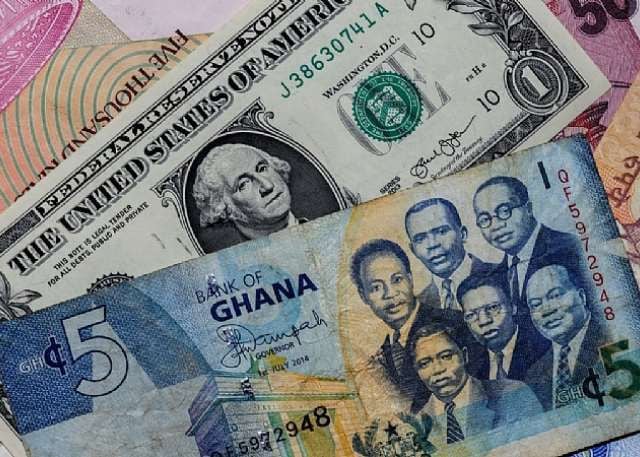The Ghanaian Cedi’s Performance Against Major Currencies on July 7, 2025
On Monday, July 7, 2025, the Ghanaian cedi experienced a slight appreciation against the US dollar, offering a glimmer of positive movement in the currency market. Data compiled from Cedirates.com, a reputable platform tracking currency and fuel prices in Ghana, reveals a nuanced picture of the cedi’s performance across different exchange platforms. This analysis delves into the specifics of these rates, comparing the cedi’s value against the US dollar, the British pound, and the euro, across various segments of the market, including forex bureaus, the Bank of Ghana interbank market, and money transfer services.
Forex Bureaus and Interbank Market Rates
At forex bureaus, the cedi traded at an average buying rate of GHS10.31 and a selling rate of GHS10.95 against the US dollar. However, the actual street rates at these bureaus showed a slightly weaker cedi, with dollar purchases costing GHS12.00 and sales fetching GHS12.40. This disparity between the average and street rates highlights the dynamic nature of the forex market and the potential for variations in pricing among different bureaus. In contrast, the Bank of Ghana’s interbank market, which typically deals with larger transactions between banks, offered a more favorable exchange rate for the cedi, with buying and selling rates of GHS10.31 and GHS10.33 respectively. This difference in rates underscores the influence of market segmentation and the volume of transactions on currency pricing.
Against the British pound, the average bureau rate stood at GHS13.89 for buying and GHS14.83 for selling. The Bank of Ghana’s interbank rate for the pound was GHS14.10, closer to the bureau’s selling rate than its buying rate. This suggests a slightly stronger cedi within the interbank market compared to the retail forex market. Similarly, for the euro, forex bureaus offered rates of GHS12.03 for buying and GHS12.81 for selling, while the interbank rate was GHS12.13, again mirroring the buying rate more closely.
Money Transfer Services and Digital Subscription Payments
Money transfer services, increasingly popular for remittances, offered competitive rates for those sending money to Ghana. LemFi and Afriex, two prominent players in this space, provided dollar rates of GHS10.30 and GHS10.31 respectively for transfers from the US or UK. For the British pound, LemFi offered GHS14.00 while Afriex offered GHS14.04. Euro rates were also competitive, with Afriex quoting GHS12.14 and LemFi offering GHS12.12. These rates generally fell within the range observed in the forex bureaus and the interbank market, highlighting the competitive landscape of the remittance sector.
For digital subscriptions like Netflix, Spotify, and Apple Music, payments made via Visa and Mastercard incurred an exchange rate of GHS11.13 for both card providers. This rate falls between the average buying and selling rates at forex bureaus, representing a relatively standardized cost for international digital services.
Analysis and Implications
The slight appreciation of the cedi against the US dollar, as indicated by the average rates, suggests a positive trend for the Ghanaian currency. However, the disparity between the average rates and the actual street rates at forex bureaus underscores the importance of comparing rates from various sources before making transactions. The more favorable rates within the Bank of Ghana interbank market reflect the influence of larger transaction volumes and the stability typically associated with institutional trading.
The competitive rates offered by money transfer services like LemFi and Afriex highlight the growing importance of this sector in facilitating international remittances and providing convenient options for individuals sending money to Ghana. The standardized rates for digital subscriptions offer transparency for consumers, although they may be subject to fluctuations in the underlying exchange rates.
Overall, the Ghanaian cedi’s performance on July 7, 2025, showcased a complex interplay of factors influencing exchange rates across different market segments. Understanding these variations and comparing rates from multiple sources is crucial for individuals and businesses engaging in foreign exchange transactions.
Comparison of Exchange Rates Across Different Platforms
The varying exchange rates across forex bureaus, the interbank market, money transfer services, and digital payment platforms highlight the importance of understanding the specific market segment and its associated pricing dynamics. The interbank market typically caters to larger transactions between financial institutions, often leading to more favorable rates due to higher trading volumes and reduced operational costs. Forex bureaus, which serve individual customers, incorporate their operational expenses and profit margins into their rates, resulting in slightly wider spreads between buying and selling prices.
Money transfer services, focused on remittances, compete on price and convenience, offering competitive exchange rates to attract customers. These services leverage technology and streamlined processes to minimize costs, allowing them to provide rates comparable to or even better than those offered by traditional forex bureaus. Digital subscription platforms, like Netflix and Spotify, often partner with payment processors that apply standardized exchange rates for international transactions. These rates are typically based on prevailing market conditions but may include a small markup to cover processing fees.
Factors Influencing Cedi’s Performance
The Ghanaian cedi’s performance against major currencies is influenced by a complex interplay of economic factors, both domestic and international. These include:
-
Supply and demand dynamics: The fundamental principle of economics dictates that the price of a currency, like any other commodity, is determined by the interaction of supply and demand. Increased demand for the cedi, perhaps due to foreign investment or export growth, would typically strengthen its value. Conversely, increased supply of the cedi, possibly due to high import demand or capital flight, can weaken its value.
-
Macroeconomic performance: The overall health of the Ghanaian economy, reflected in indicators such as GDP growth, inflation rates, and fiscal balances, significantly impacts the cedi’s value. Strong economic performance generally attracts foreign investment and strengthens the currency.
-
Global market conditions: International events, such as changes in commodity prices, global interest rates, or shifts in investor sentiment, can significantly impact the cedi’s value. For instance, a rise in global oil prices could negatively affect Ghana’s trade balance and weaken the cedi.
-
Government policies: Monetary and fiscal policies implemented by the Bank of Ghana and the Ghanaian government can influence the cedi’s value. Interest rate adjustments, foreign exchange interventions, and fiscal measures can all impact currency markets.
Future Outlook and Predictions
Predicting future currency movements is inherently challenging, given the complex interplay of factors involved. However, analyzing current trends and anticipating potential future developments can offer some insight. The slight appreciation of the cedi on July 7, 2025, may signal a positive trend, but continued monitoring is essential to assess its sustainability. Factors to watch include:
-
Government economic policies: Upcoming government policies, such as potential fiscal reforms or monetary policy adjustments, could significantly impact the cedi’s trajectory.
-
Global economic outlook: International economic developments, such as global growth forecasts and commodity price trends, will continue to exert influence on the cedi’s value.
-
Investor sentiment: Shifts in investor confidence towards the Ghanaian economy can affect capital flows and influence the cedi’s performance.
By continuously monitoring these factors and analyzing their potential impact, individuals and businesses can make informed decisions related to foreign exchange transactions and manage their currency risk effectively.














